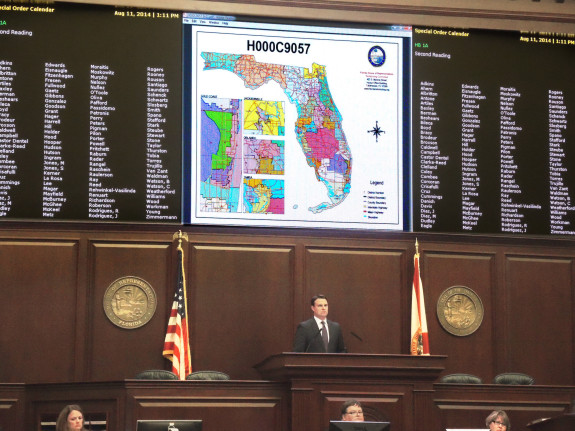
A circuit court judge approved Florida’s new congressional maps for 2016. (Photo via MyFloridaHouse.gov)
By Ashley Lopez
Florida Center for Investigative Reporting
A circuit court judge in Tallahassee ruled Friday the state’s troubled congressional map will be in place for the upcoming election. Judge Terry Lewis also approved a new map the state legislature drew earlier this month during a special session.
Lewis ordered the state to redraw the congressional districts it created in 2012. Lewis ruled lawmakers violated a set of voter-backed laws aimed at stopping the Legislature from drawing politically motivated maps.
According to Lewis, lawmakers facilitated a “secret, organized campaign” wherein partisan political operatives influenced the redistricting process in violation of the Fair Districts Amendments, which mandates that the state draw districts without political party favoritism.
The ruling was a big win to a coalition of voters, as well as the Florida League of Women Voters, who launched a legal challenge to the GOP-led Legislature’s maps.
According to The Miami Herald, this latest ruling means the “flawed congressional districts may remain in place for two more years and newly drawn boundaries for seven north and central districts don’t have to take effect until 2016.”
That will come as a relief to U.S. Rep. Corrine Brown, D-Jacksonville, and U.S. Rep. Dan Webster, R-Winter Garden, whose congressional districts were the target of the court’s criticism. Brown and Webster feared being elected to a new term in November only to have to face a special election possibly next year under the newly configured boundaries.
However, this is a blow to the groups that challenged state lawmakers in court. The League, and others, argued the state should not hold elections using districts the court ruled was unconstitutional.
In his ruling on Friday, Lewis said the legislature was not required to please everyone. “The legislature is only required to produce a map that meets the requirements of the Constitution,” he wrote.
A special election is not “an appropriate remedy,” Lewis added.
Delaying November’s elections in the affected districts until maps could be redrawn and scheduling a special election could be expensive and confuse voters, the judge had previously noted.
Plaintiffs testified on Wednesday that legislators made only minor changes to the invalidated districts of U.S. Representative Corrine Brown of Jacksonville, and trimmed the district of Representative Daniel Webster, an Orlando-area Republican, to comply with the judge’s order.
But while Brown’s district “is not a model of compactness, it is much improved,” Lewis said.
The revised maps approved by the judge on Friday will probably produce the same 17-10 Republican majority in Florida’s delegation to the U.S. House of Representatives, an expert testifying for the plaintiffs told Wednesday’s hearing.
This is unlikely to be end of this legal battle, though. Plaintiffs in the case are already vowing to appeal Lewis’ latest ruling.
David King, a lawyer for the League of Women Voters, said in a statement that the group was “disappointed” and plans to appeal the ruling.
Voting rights groups argued the revised map was still unconstitutional and that the changes were superficial. Lewis disagreed and said that District 5 was “much improved” and is now “less serpentine and visually more compact.” The changes also removed an “appendage” designed to benefit a Republican incumbent in District 10, Lewis said.
…King argued at a hearing this month that the maps didn’t follow a constitutional amendment prohibiting gerrymandering and District 5 was oddly shaped to the detriment of Democrats.
“What they are really protecting is their Republican interest and they are preventing, they are constraining, more African-American representation” he said.
There is also an ongoing legal dispute over whether documents used in the redistricting process by private political consultants should be made public. As of now, only Judge Lewis and the parties in the case have seen them.
